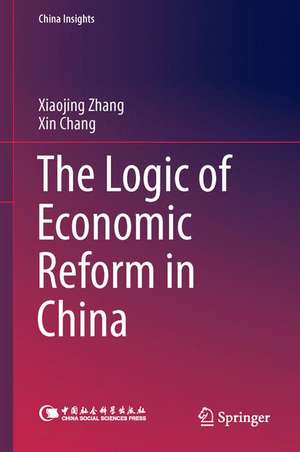The Logic of Economic Reform in China: China Insights
Autor Xiaojing Zhang, Xin Changen Limba Engleză Hardback – 28 noi 2015
| Toate formatele și edițiile | Preț | Express |
|---|---|---|
| Paperback (1) | 359.33 lei 38-44 zile | |
| Springer Berlin, Heidelberg – 23 aug 2016 | 359.33 lei 38-44 zile | |
| Hardback (1) | 394.71 lei 3-5 săpt. | |
| Springer Berlin, Heidelberg – 28 noi 2015 | 394.71 lei 3-5 săpt. |
Din seria China Insights
- 18%
 Preț: 998.66 lei
Preț: 998.66 lei - 18%
 Preț: 784.79 lei
Preț: 784.79 lei -
 Preț: 381.42 lei
Preț: 381.42 lei -
 Preț: 390.08 lei
Preț: 390.08 lei -
 Preț: 388.13 lei
Preț: 388.13 lei - 15%
 Preț: 700.75 lei
Preț: 700.75 lei - 18%
 Preț: 954.45 lei
Preț: 954.45 lei -
 Preț: 391.61 lei
Preț: 391.61 lei - 15%
 Preț: 646.43 lei
Preț: 646.43 lei -
 Preț: 390.46 lei
Preț: 390.46 lei - 18%
 Preț: 1115.46 lei
Preț: 1115.46 lei -
 Preț: 390.84 lei
Preț: 390.84 lei -
 Preț: 394.51 lei
Preț: 394.51 lei -
 Preț: 488.12 lei
Preț: 488.12 lei -
 Preț: 393.35 lei
Preț: 393.35 lei - 20%
 Preț: 569.00 lei
Preț: 569.00 lei - 15%
 Preț: 637.59 lei
Preț: 637.59 lei - 18%
 Preț: 997.09 lei
Preț: 997.09 lei - 18%
 Preț: 895.89 lei
Preț: 895.89 lei - 15%
 Preț: 637.46 lei
Preț: 637.46 lei - 18%
 Preț: 778.63 lei
Preț: 778.63 lei - 18%
 Preț: 724.80 lei
Preț: 724.80 lei - 15%
 Preț: 698.30 lei
Preț: 698.30 lei
Preț: 394.71 lei
Nou
Puncte Express: 592
Preț estimativ în valută:
75.53€ • 79.06$ • 62.86£
75.53€ • 79.06$ • 62.86£
Carte disponibilă
Livrare economică 10-24 martie
Preluare comenzi: 021 569.72.76
Specificații
ISBN-13: 9783662474037
ISBN-10: 3662474034
Pagini: 170
Ilustrații: XVII, 200 p. 6 illus., 2 illus. in color.
Dimensiuni: 155 x 235 x 18 mm
Greutate: 0.57 kg
Ediția:1st ed. 2016
Editura: Springer Berlin, Heidelberg
Colecția Springer
Seria China Insights
Locul publicării:Berlin, Heidelberg, Germany
ISBN-10: 3662474034
Pagini: 170
Ilustrații: XVII, 200 p. 6 illus., 2 illus. in color.
Dimensiuni: 155 x 235 x 18 mm
Greutate: 0.57 kg
Ediția:1st ed. 2016
Editura: Springer Berlin, Heidelberg
Colecția Springer
Seria China Insights
Locul publicării:Berlin, Heidelberg, Germany
Public țintă
ResearchCuprins
Six Logics for Chinese Economic Reform.- Systematic Reform.- The Relationship Between Reform.- The Reform Practice.- The Global System Competition.
Notă biografică
Xiaojing Zhang is a Professor of Economics and the General Office Director, Academic Division of Economics, Chinese Academy of Social Sciences (CASS). He is the Chief Expert of State Policy-Making Consulting Program sponsored by China’s National Social Sciences Fund. He’s also been participating in the research and consulting work for the national “11th Five-year Plan”, “12th Five-year Plan” and “13th Five-year Plan”. An author of several books and papers, Prof. Zhang is also the recipient of prestigious awards such as the SUN Yefang Economics Prize (Top Economics Award in China) for 2005 and 2007, and also the National Book Award of China in 2002. He was a Visiting Scholar at the International Monetary Fund in 2009; a Visiting Professor at Harvard and National Bureau of Economic Research (NBER) in 2006-2007; and a Visiting Fellow at Stockholm School of Economics, from 1999-2000. His research interests are open economy macroeconomics, economic growth and development economics. He received his Ph.D. in economics from the Graduate School of CASS (Beijing) in 1998.
Textul de pe ultima copertă
This book provides a historical overview of Chinese economic reform over the past 30 years. From the genesis of the reform to the gradual improvement of the market system, and then to the re-start of the critical stage of the reform, this book includes not only research on the reform process, but also detailed descriptions of the key areas of reform since the Third Plenary Session of the 18th CPC Central Committee. On this basis, the author develops six logics for Chinese economic reform. Firstly, reform is cyclical, moving between rapid advances and deadlock; this calls upon us to re-examine the common view of reform. Secondly, reform is systematic; it cannot succeed without supporting reforms in other fields. Thirdly, the relationship between reform, development and stability should be properly handled. This “trinity” is quite different from the perspective of western mainstream theory, which puts too much emphasis on efficiency. Fourthly, the success of Chinese reform was not achieved by chance. The reform practice is based on the theoretical logic, and also goes beyond the debate between progressive and radical modes. Fifthly, the Top-level Design should be combined with “crossing the river by moving from stone to stone,” i.e., the theoretical basis of reform should be combined with reform practice. Sixthly and lastly, the ongoing reform in China must be understood in the contexts of global competition and reform competition.
Caracteristici
The author is a highly respected economist in China Addresses a hot topic for scholars and general readers alike, demystifying the Chinese economic development path, its speed and its logic Employs analytical methods from the field of economics












